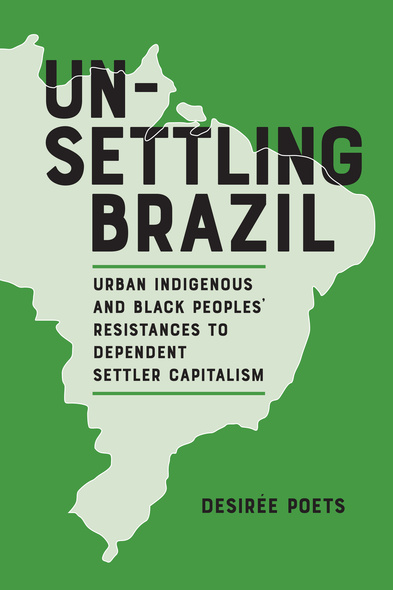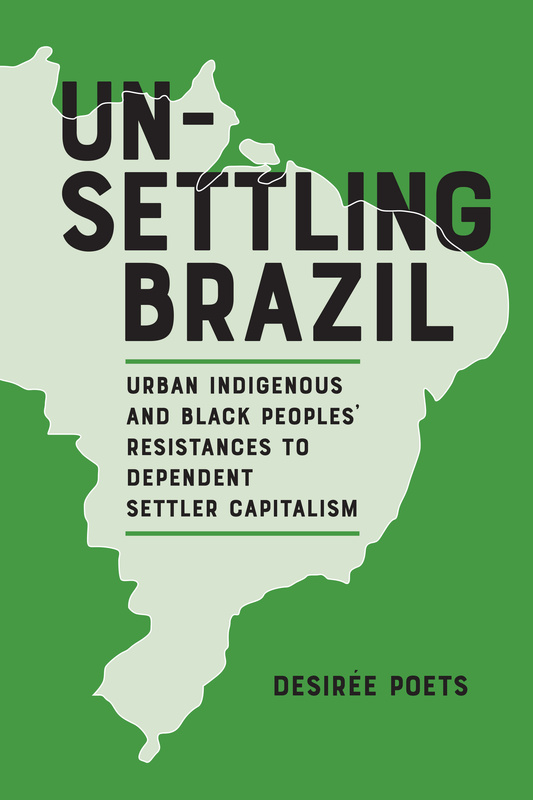Our shopping cart is currently down. To place an order, please contact our distributor, UTP Distribution, directly at utpbooks@utpress.utoronto.ca.

Unsettling Brazil
Urban Indigenous and Black Peoples' Resistances to Dependent Settler Capitalism
Analyzes favela, quilombola, and indigenous communities’ responses to settler colonialism in urban Brazil. Based on ethnographic research and her experiences growing up in Brazil, the author tells the stories of communities in Rio de Janeiro, São Paulo, and Belo Horizonte
Unsettling Brazil offers a powerful account of five urban Indigenous and Black communities and movements in Brazil that illuminates their struggle for land, dignity, and their ways of life amid historic and ongoing settler colonialism, marked by militarization and dependent capitalist development. The in-depth case studies are the Indigenous movement Aldeia Maracanã and the quilombola community Sacopã in Rio, the Quilombo dos Luízes in Belo Horizonte, the Indigenous movement behind the Pindorama scholarship program in São Paulo, and the Complexo da Maré favela in Rio. For each, Poets vividly documents the intersectional and transnational structures of power that perpetuate the erasure, dispossession, and exploitation of nonwhite populations and the creative ways that Black and Indigenous communities have mobilized to unsettle these structures.
Drawing on the knowledge produced by Black and Indigenous organizers and thinkers, Poets argues for an interdisciplinary framework that prioritizes the voices and experiences of these communities. Addressing increasingly salient calls for decolonization, Poets ponders the paradoxical role of rights, citizenship, and the state in the fight for freedom and justice. Unsettling Brazil urges readers to confront the uncomfortable truths about the nation's history and stands in solidarity with those fighting to reclaim their heritage, identity, and land.
‘Unsettling Brazilmakes an original and significant contribution to the field of Brazilian Indigenous and quilombo studies. Little, if anything, has been published in English on urban Indigenous and quilombo communities, their histories and struggles in Brazil.’
—Jan French, author of Legalizing Identities: Becoming Black or Indian in Brazil’s Northeast
‘Unsettling Brazil is convincing: an innovative lens for interpreting contemporary political contestations in Brazil.’
—Lorenzo Veracini, author of The World Turned Inside Out: Settler Colonialism as a Political Idea
This really is a fabulous piece of work and I do not say so lightly. It is written with exceptional poise and precision, and the arguments advanced offer much needed insight into the nature of contemporary urban Indigenous and Black forms of place—and community—making as resistance to the settler capitalist state. I particularly appreciated the commitment to centering and ‘speaking nearby’ the stories of five different Black and Indigenous urban forms of resistance—aldeias, quilombos, favelas and student groups—and to the level of engagement displayed throughout with the communities involved. The book should be ready by anyone working within or across the disciplines and fields of anthropology and sociology, Brazilian and Latin American studies, and Indigenous and decolonial studies.’
—Thea Pitman, author of Decolonizing the Museum: The Curation of Indigenous Contemporary Art in Brazil
Desirée Poets is assistant professor of postcolonial theory and a core faculty of the ASPECT PhD program at Virginia Tech. She has published articles and book chapters on settler colonialism, community change, and (de)militarization in Brazil.




